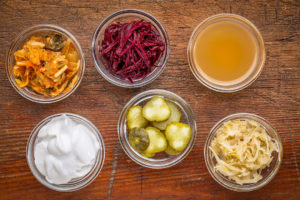 The gut is home to trillions of bacteria in the body. Some of these bacteria are bad. They can cause infection, sickness, or discomfort. Other bacteria are good. These good bacteria, also known as probiotics, help us to digest food, encourage bowel movements, fight off bad bacteria and other pathogens, and much more. Maintaining a healthy balance of good bacteria in the gut is important to keep the bad ones in check. We all know “you are what you eat” is a fun turn of phrase used to encourage healthy eating, but when it comes to the bacteria in our guts, it’s the truth! The foods we put into our bodies have a direct impact on the makeup of our microbiotas. Eating the right foods can help to populate our guts with bacteria that will keep us healthy and provide nutrients needed by the healthy bacteria we already have. In a previous blog, we talked about one of the best types of food for the gut, fermented foods. Fermentation is a technique that has been used for thousands of years because of its effectiveness in food preservation, but it also results in foods packed with nutritional value. This is because the fermentation process facilitates the growth of probiotics. Even just a few tablespoons of fermented sauerkraut can contain several million or even billions of probiotics. Fermented foods are diverse and versatile, ranging from dairy to vegetables to breads and more. When you think of probiotics in foods, the first thing that comes to mind is probably yogurt. The right kinds of yogurt (and its liquid cousin, kefir) can be great natural sources for probiotics. Yogurt can be eaten straight or used to make dips, dressings, or smoothies. Sauerkraut is chopped, fermented cabbage that is tangy and packed with probiotics. It can be eaten as is, added to sandwiches, burgers, baked potatoes, or mixed in with salads. Many commonly sold sauerkrauts are pickled, not fermented, so make sure you are buying the right kind for gut health purposes. Kimchi is another fermented vegetable dish packed with probiotics and flavor. It normally comes as cabbage or radish mixed with chili, garlic, ginger, and other spices. It makes a great accompaniment to savory dishes of all varieties. Miso is a Japanese seasoning made from fermented soybeans. It is the most well-known as a soup, but miso is also great in salad dressings and marinades. Kombucha is a fermented tea drink with a tangy kick that can be flavored in many ways or used as a base for some delicious cocktails.
The gut is home to trillions of bacteria in the body. Some of these bacteria are bad. They can cause infection, sickness, or discomfort. Other bacteria are good. These good bacteria, also known as probiotics, help us to digest food, encourage bowel movements, fight off bad bacteria and other pathogens, and much more. Maintaining a healthy balance of good bacteria in the gut is important to keep the bad ones in check. We all know “you are what you eat” is a fun turn of phrase used to encourage healthy eating, but when it comes to the bacteria in our guts, it’s the truth! The foods we put into our bodies have a direct impact on the makeup of our microbiotas. Eating the right foods can help to populate our guts with bacteria that will keep us healthy and provide nutrients needed by the healthy bacteria we already have. In a previous blog, we talked about one of the best types of food for the gut, fermented foods. Fermentation is a technique that has been used for thousands of years because of its effectiveness in food preservation, but it also results in foods packed with nutritional value. This is because the fermentation process facilitates the growth of probiotics. Even just a few tablespoons of fermented sauerkraut can contain several million or even billions of probiotics. Fermented foods are diverse and versatile, ranging from dairy to vegetables to breads and more. When you think of probiotics in foods, the first thing that comes to mind is probably yogurt. The right kinds of yogurt (and its liquid cousin, kefir) can be great natural sources for probiotics. Yogurt can be eaten straight or used to make dips, dressings, or smoothies. Sauerkraut is chopped, fermented cabbage that is tangy and packed with probiotics. It can be eaten as is, added to sandwiches, burgers, baked potatoes, or mixed in with salads. Many commonly sold sauerkrauts are pickled, not fermented, so make sure you are buying the right kind for gut health purposes. Kimchi is another fermented vegetable dish packed with probiotics and flavor. It normally comes as cabbage or radish mixed with chili, garlic, ginger, and other spices. It makes a great accompaniment to savory dishes of all varieties. Miso is a Japanese seasoning made from fermented soybeans. It is the most well-known as a soup, but miso is also great in salad dressings and marinades. Kombucha is a fermented tea drink with a tangy kick that can be flavored in many ways or used as a base for some delicious cocktails.  Fermented foods are mostly known for their probiotic benefits, but there are some fermented foods that are healthy for other reasons. Tempeh is a fermented version of tofu. It’s made of fermented soybeans that are pressed into a cake. Unlike most fermented foods, unpasteurized tempeh cannot be eaten raw, but even after being cooked, tempeh offers great health benefits to the gut. It is a very nutrient-rich food, with plenty of protein, fiber, and calcium. The fermentation process has also been shown to decrease the phytic acid content of the soybeans. Phytic acid is often referred to as an ‘anti-nutrient’, as large amounts of it can prevent the body from properly absorbing nutrients like iron, zinc, and calcium. Tempeh can be eaten grilled, sauteed, stir-fried, and in plenty of other ways. Sourdough bread is another fermented food that offers similar nutritional benefits to tempeh. Sourdough is slow fermented bread. The sourdough culture is filled with probiotics before cooking. While the probiotics are killed off during the cooking process, the fermentation process instills the bread with other fantastic health benefits. Much like the soybeans in tempeh, sourdough bacteria and yeast decrease phytic acid present in the flour, thereby allowing the nutrients in the bread to be better absorbed by our bodies. Sourdough bacteria also consume sugar during the fermentation process. This results in a lower glycemic index than other breads. By feeding on this sugar, the sourdough bacteria produce lactic acid, which gives the bread its characteristic sour flavor and allows it to last longer than other homemade breads, as the presence of lactic acid gives the bread anti-mold properties. Sourdough bread is a great option for giving a tangy kick to your everyday sandwich options. Tempeh and sourdough bread are great at showing off the range of gut health benefits that fermented foods can provide beyond probiotics, but for most fermented foods, probiotics are the stars. Eating fermented foods daily can be a great way to introduce probiotics to your gut. Even if you are eating fermented foods regularly, it’s a good idea to also consider a probiotic supplement like Probonix. Probonix has a special acid formulation that better protects its probiotic strains from stomach acid, so more of them make it alive to the gut. It also has 8-12 different strains of bacteria per bottle, while fermented foods typically only have a couple each. This means that you need to regularly eat many kinds of fermented foods for the sake of strain diversity. The good news is that fermented foods and Probonix are perfect complements to each other. Fermented foods provide you with healthy bacteria, digestive aid, and nutritional benefits, while Probonix supports your gut with strain diversity and protection from stomach acid. They work even better in tandem than they do on their own, so make sure to consider both when looking for ways to bolster your gut health. Stay tuned next month for part 2 of Good Foods for Gut Health!
Fermented foods are mostly known for their probiotic benefits, but there are some fermented foods that are healthy for other reasons. Tempeh is a fermented version of tofu. It’s made of fermented soybeans that are pressed into a cake. Unlike most fermented foods, unpasteurized tempeh cannot be eaten raw, but even after being cooked, tempeh offers great health benefits to the gut. It is a very nutrient-rich food, with plenty of protein, fiber, and calcium. The fermentation process has also been shown to decrease the phytic acid content of the soybeans. Phytic acid is often referred to as an ‘anti-nutrient’, as large amounts of it can prevent the body from properly absorbing nutrients like iron, zinc, and calcium. Tempeh can be eaten grilled, sauteed, stir-fried, and in plenty of other ways. Sourdough bread is another fermented food that offers similar nutritional benefits to tempeh. Sourdough is slow fermented bread. The sourdough culture is filled with probiotics before cooking. While the probiotics are killed off during the cooking process, the fermentation process instills the bread with other fantastic health benefits. Much like the soybeans in tempeh, sourdough bacteria and yeast decrease phytic acid present in the flour, thereby allowing the nutrients in the bread to be better absorbed by our bodies. Sourdough bacteria also consume sugar during the fermentation process. This results in a lower glycemic index than other breads. By feeding on this sugar, the sourdough bacteria produce lactic acid, which gives the bread its characteristic sour flavor and allows it to last longer than other homemade breads, as the presence of lactic acid gives the bread anti-mold properties. Sourdough bread is a great option for giving a tangy kick to your everyday sandwich options. Tempeh and sourdough bread are great at showing off the range of gut health benefits that fermented foods can provide beyond probiotics, but for most fermented foods, probiotics are the stars. Eating fermented foods daily can be a great way to introduce probiotics to your gut. Even if you are eating fermented foods regularly, it’s a good idea to also consider a probiotic supplement like Probonix. Probonix has a special acid formulation that better protects its probiotic strains from stomach acid, so more of them make it alive to the gut. It also has 8-12 different strains of bacteria per bottle, while fermented foods typically only have a couple each. This means that you need to regularly eat many kinds of fermented foods for the sake of strain diversity. The good news is that fermented foods and Probonix are perfect complements to each other. Fermented foods provide you with healthy bacteria, digestive aid, and nutritional benefits, while Probonix supports your gut with strain diversity and protection from stomach acid. They work even better in tandem than they do on their own, so make sure to consider both when looking for ways to bolster your gut health. Stay tuned next month for part 2 of Good Foods for Gut Health!
If you like this, you’d also like:


